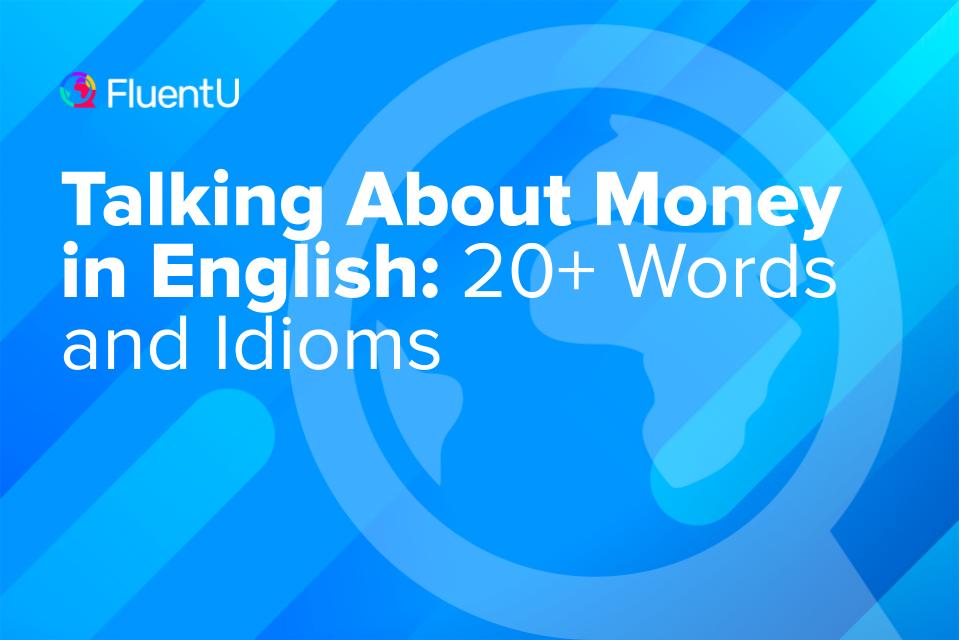Talking About Money in English: 20+ Words and Idioms

No matter where you go and why you go there, you’ll need to talk about money. From buying plane tickets to calling a taxi, you’ll need to understand what people are saying.
In this post, you’ll find 30 words and idioms you can use to discuss money in English, with example sentences and audio.
Download: This blog post is available as a convenient and portable PDF that you can take anywhere. Click here to get a copy. (Download)
Important Money Words
1. Cash
Meaning: Cash is any kind of money in the form of bills (paper money) or coins. It’s the easiest way to pay someone if you’re physically going out to buy something.
Your total is $14.99. Will you be paying with cash or credit card?
Below, you’ll find the two main types of cash in English: coins and bills.
2. Coins
Meaning: As seen above, one form of cash you may use is coins. Coins are often round in shape, although this can vary depending on the currency.
The child saved the coins he earned as pocket money to use at the fun fair.
3. Bills
Meaning: Instead of only using coins, to avoid having to carry tons of coins around when dealing with a higher value of money, you can use bills.
Have you got a $5 bill? I haven’t got enough quarters to put in the vending machine.
Note that some English-speaking countries like Australia, New Zealand and the UK use the term “banknote,” or more commonly “note,” instead of bill.
4. Card
Meaning: Nowadays, it’s far more common for people to carry these around and make payments “by card.” Not only are there certain places that no longer accept cash, but for many, it’s a simpler and safer way to carry money and make purchases.
This shop only accepts payments by card.
The most common types of cards are a “debit card,” a card that already has the amount of cash required to make the purchase available, and a “credit card,” a card that allows you to make purchases by borrowing money, which you will then pay back over a period of time.
5. Sales slip / Receipt
Meaning: When you buy something in a store, you are given a sales slip or receipt. This can either be printed out on paper or sent to you via email. It’s used as a proof of purchase and is important to keep in case you need to return the item.
I was given a sales slip when I bought the TV, but I can’t find it anywhere.
I gave them my email address so they could email me the receipt.
6. Change
Meaning: In this context, the word change can have various meanings.
Firstly, it can mean the money you are given back after paying for something using cash:
This term can also refer to coins:
Do you have any change? I need a quarter.
7. Income
Meaning: The amount of money a person earns per month or per year. A person can earn an income through work, collecting rent or by investing in other companies (also called an investor).
Earning a good income in this economy is a really hard task.
8. Thrifty
Meaning: To be thrifty is to use money very carefully, without wasting. The word can mean positive and negative things based on the context and the intent of the speaker.
9. Haggle
Meaning: This word is similar to the word “negotiate,” but it’s generally used in an informal context. To haggle with someone is to discuss the price of an object persistently (without ceasing).
Miss Thurstone always haggles with the baker to save five cents on every purchase.
10. Discount
Meaning: When a shop or a business lowers prices of something for a limited period, it’s called a discount. If you’re in the US, this is especially important on “Black Friday,” the day after Thanksgiving when the largest discounts of the year are given in many stores. (A day where lots of Americans shop for Christmas gifts.)
To learn more vocabulary related to shopping, read this post.
11. Budget
Meaning: The amount of money available to spend on something is called a budget. It can also mean a plan where you decide how and where you will spend the money you have over a specific time period, like a monthly or weekly budget.
12. Deal
Meaning: A deal can mean an agreement or arrangement between two or more businesses. As a verb it can also refer to doing business in something or with someone.
Apple had a deal with Samsung where they agreed to manufacture smartphones together.
13. Credit
Meaning: When you buy something or enjoy a service with the promise of paying in the future, it’s called “credit.” This is where “credit cards” get their name, and it’s a common practice almost anywhere in the world.
14. Debt
Meaning: You are said to be in debt when you owe money to someone. Both individuals and companies can be in debt, and the word is used for more formal occasions such as taking a loan from a bank or a company.
15. Business negotiation
Meaning: If you have a formal discussion with others to reach an agreement between all the people involved, then it’s called a negotiation. Generally people negotiate when they want something from each other but some demands are not acceptable to the other parties.
When these discussions happen between businesses, then they are known as “business negotiations.”
16. Profit / Loss
Meaning: Profit is when a person or business makes more money selling something than buying or producing that thing. Loss is when one has to give more money in making or buying a product or service than the money they receive after selling it.
17. Market
Meaning: A market is a place where you buy and sell things, whether it be a shopping market or the stock market. It can also be used as a verb. “To market” something is to promote a product or a brand.
I prefer our neighborhood market over the mall. There are so many unique things you can find there!
18. Industry
Meaning: The processes, people, tools, factories and things used to create a product or service. For instance, the car industry includes everything involved in making cars.
19. Recession
Meaning: In general, “recession” means the act of receding or withdrawing from something or somewhere. In terms of money, a recession is a period of decreased economic activity where people lose jobs and things get more expensive. The last major recession happened in 2008 and affected most of the world.
20. Currency
Meaning: In today’s world we generally use this word for the official currencies of different countries. Dollar, pound, rupee, yen, ruble, etc. are all examples of currency.
Common Idioms to Talk About Money
Money doesn’t grow on trees
Meaning: This phrase is used when you want to mock someone who spends without thinking. It means that money is hard to earn and it’s not free, unlike the leaves of any tree.
Squirrel away money
Meaning: Squirrels have this amusing habit of storing away large amounts of food in secret places for the winter. When someone does the same thing with money, we use this idiom. Generally, someone does this so they have a substantial amount of money they can use in times of crisis.
Break the bank
Meaning: To break the bank is to use all your money to buy something. It’s also used when you need to say that something is far too costly and you cannot afford it.
Bread and butter
Meaning: Bread and butter is often considered to be the essential diet of many English-speaking people. In terms of money, it’s used for the work you do to earn your basic income, with which you can feed yourself and your family.
Although I like writing novels, being a banker is my bread and butter.
To be flat broke
Meaning: To be “broke” or “flat broke” is to have absolutely no money. It’s informally used to mean that you are having difficulty buying even basic things like good food or bus tickets.
With this salary, I’m always flat broke by the end of the month. I think I need to find another job.
Give a ballpark figure
Meaning: When you give a rough estimate of some calculations involving money, you use this idiom.
To cost an arm and a leg
Meaning: When something is very expensive, it costs an arm and a leg.
To throw money down the drain
Meaning: This idiom is used to say that money is being wasted.
To have money to burn
Meaning: When you have a lot of money, often more than necessary, then you are said to have money to burn (spend or waste).
Five years ago he won the lottery and invested everything. He now has a lot of money to burn.
To tighten one’s belt
Meaning: This idiom refers to being more careful with your money and spending less.
Lately, he’s been trying to tighten his belt and only buy what he really needs.
Resources to Learn How to Talk About Money in English
Learning new vocabulary and witty English idioms is important to talk about money.
It’s also essential to know what you should not say in a simple English conversation. Money can be a very sensitive subject for people. For instance, asking someone what their salary is, especially when you’re meeting them for the first time, is thought to be extremely rude in English-speaking societies.
Saying that someone else is having financial difficulties in front of other people can be seen as an attempt to make the other person look bad. But if you share your own financial difficulties with other people, they’ll often think that you trust them and this can make your relationship stronger.
For some real-life examples of people talking about money, check out these videos:
- A YouTuber talks about how he earns his income. Notice how he mentions that he was hesitant about making this video even though his fans were interested in it since the beginning.
- In this video, you’ll see a role-play where the audience is taught strategies to ask for a raise from your employer.
- This video gives you tips on how to haggle for a used car.
These are just a few examples of people discussing money.
You can find more examples like these by listening to podcasts that talk about money-related topics. You can also watch native speakers discuss money and other topics in authentic English videos on FluentU.
FluentU takes authentic videos—like music videos, movie trailers, news and inspiring talks—and turns them into personalized language learning lessons.
You can try FluentU for free for 2 weeks. Check out the website or download the iOS app or Android app.
P.S. Click here to take advantage of our current sale! (Expires at the end of this month.)

You can also use apps like Duolingo or Memrise that have vocabulary lists specifically related to money and brush up on your vocabulary before you dive into listening.
This is everything you need to know to start talking about money in English. Try to use the words and the idioms in places where it feels right.
And never be afraid to make mistakes! You’ll learn a lot just by talking to native speakers who are enthusiastic about money.
Download: This blog post is available as a convenient and portable PDF that you can take anywhere. Click here to get a copy. (Download)
And One More Thing...
If you like learning English through movies and online media, you should also check out FluentU. FluentU lets you learn English from popular talk shows, catchy music videos and funny commercials, as you can see here:
The FluentU app and website makes it really easy to watch English videos. There are captions that are interactive. That means you can tap on any word to see an image, definition, and useful examples.
For example, when you tap on the word "searching," you see this:
Learn all the vocabulary in any video with quizzes. Swipe left or right to see more examples for the word you’re learning.

FluentU helps you learn fast with useful questions and multiple examples. Learn more.
The best part? FluentU remembers the vocabulary that you’re learning. It gives you extra practice with difficult words—and reminds you when it’s time to review what you’ve learned. You have a truly personalized experience.
Start using the FluentU website on your computer or tablet or, better yet, download the FluentU app from the iTunes or Google Play store. Click here to take advantage of our current sale! (Expires at the end of this month.)










